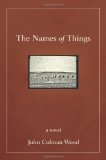Summary | Excerpt | Reviews | Beyond the Book | Readalikes | Genres & Themes | Author Bio

 Book Reviewed by:
Book Reviewed by:
Kim Kovacs
Buy This Book
It was Ado, Abudo’s wife.
He greeted. Bartu? he said. Are you strong?
Eh, she replied. She stood.
Nageni badada? Is there peace?
Badad’. There is.
Ijole urgoftu? he asked. Do the children smell good?
She suppressed a laugh. Urgoftu. They smell good.
The question was not often asked, but since he had learned it
he had asked it mainly because he liked the way it sounded and he
liked the meaning. Did the children smell good? Were they healthy
and happy? Ado smiled whenever he asked it, and he liked to see her
smile, so he had asked it every time. She lifted her hand shyly to cover
her mouth.
Drink, she said and returned to the tent.
He was hungry and tired. He took a long draught of the milk. It
was as good as he remembered, cool with the evening, smoke flavored
from the way they preserved the containers with coals, slick on his dry
throat. He knew to drink his fill and pass the bowl back. He drank half
the milk and handed the bowl to Elema, who took it and held the bowl
out for his wife in the tent.
The other man left. Ali turned up.
Tired from the journey, the ferenji lay on the skin beside Ali,
wrapped himself in his sheet, and stared up at the stars, most of which
were now hidden by black patches of cloud. It was eerie, like a negative
picture. He could not see the clouds in the darkness but knew
them because he could not see the stars they obscured. The sky was a
map of the universe with blank areas, unknown territories—unknown
to the mapmakers anyway, not to the inhabitants. The clouds were a
good sign.
The milk bowl came out for Ali, who drank and passed it back. Ali
lay down beside him on the cow skin.
Ali said the ferenji’s name. Said his name again. And again. He
woke, grunted. Ali told him to eat. He looked up. Ali was sitting beside
a bowl of meat. He could hear Elema inside the tent talking softly
with his wife. He looked at his watch. It was just after one o’clock in
the morning. Elema had killed a goat. He didn’t want the meat. He
wanted to sleep. But he sat up and reached into the bowl, feeling for a
piece, and ate it. He found and ate another. He ate several more. He ate
enough to be polite. Then he lay down. He cocooned his head inside
the sheet. Ali looked back at him and continued eating.
Ali knew better. Eat meat when you can eat meat.
Later he woke cold, windblown, numb from the constant rubbing
of air on his skin. The camp was quiet, save the ranting of goats and
sheep. They never sleep, he thought. At least not all at once. He got up
and hobbled over to the camel corral. His feet were sore, his back stiff.
He squatted and pissed. The sky was black, no stars. The moon would
have risen but no light leaked through the clouds.
He lay back on the skin. Ali was on his side, facing the tent, asleep.
It had been simple traveling. He knew what to do: Put one foot in
front of the other. Now he’d come to the edge of something, and it was
time to speak, but he had no words. The fear washed over him that he
didn’t know his lines, hadn’t read the script, didn’t know if there was a
script. On the journey he’d set aside the nagging questions about what
to do by telling himself that something would come to him when he
arrived. Well, he was here. He’d come halfway around the world to see
these people, not because they invited him, or even expected him, but
because he wanted to see them, wanted them to want to see him. He
wanted them to see. And he didn’t want to make things worse.
He heard but did not feel the wind, and then he felt it. He smelled
the dust. Then he felt drops, big musky clops.
Ali rose with his sheet pulled over his head, open at the face,
and without speaking the two lifted the skins and squeezed into the
tent. Before they were inside, the air was water, and he had to breathe
through his mouth not to choke.
Excerpted from The Names of Things by John C Wood. Copyright © 2012 by John C Wood. Excerpted by permission of Ashland Creek Press. All rights reserved. No part of this excerpt may be reproduced or reprinted without permission in writing from the publisher.





The Flower Sisters
by Michelle Collins Anderson
From the new Fannie Flagg of the Ozarks, a richly-woven story of family, forgiveness, and reinvention.

The House on Biscayne Bay
by Chanel Cleeton
As death stalks a gothic mansion in Miami, the lives of two women intertwine as the past and present collide.

The Funeral Cryer by Wenyan Lu
Debut novelist Wenyan Lu brings us this witty yet profound story about one woman's midlife reawakening in contemporary rural China.
Your guide toexceptional books
BookBrowse seeks out and recommends the best in contemporary fiction and nonfiction—books that not only engage and entertain but also deepen our understanding of ourselves and the world around us.